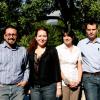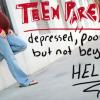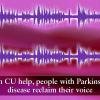Clint Talbott
 Catalan is a romance language spoken in four European countries: Spain, France, Italy and the Principality of Andorra. Catalan people feel deep pride in their culture and language, a fact that will be conveyed in courses taught at the University of
Catalan is a romance language spoken in four European countries: Spain, France, Italy and the Principality of Andorra. Catalan people feel deep pride in their culture and language, a fact that will be conveyed in courses taught at the University of In the fall of 1980, Ken Bickers was working in a Washington, D.C., political office. He’d come to the nation’s capital as part of a not-for-profit internship program, and the experience augured his career.
In the fall of 1980, Ken Bickers was working in a Washington, D.C., political office. He’d come to the nation’s capital as part of a not-for-profit internship program, and the experience augured his career. When Stefanie Mollborn asks her students how many teen-agers will get pregnant, they guess low. That’s because in college students’ circles, teen pregnancy is rare. Only 2 percent of teen mothers later earn a college degree, the U.S. Census Bureau reports.
When Stefanie Mollborn asks her students how many teen-agers will get pregnant, they guess low. That’s because in college students’ circles, teen pregnancy is rare. Only 2 percent of teen mothers later earn a college degree, the U.S. Census Bureau reports. Roger Pielke Jr. boils it down to a question: How long will the world embrace climate policies that have failed? More precisely, when will it embrace policies that are more likely to lower greenhouse-gas emissions and meet the world’s energy demand?
Roger Pielke Jr. boils it down to a question: How long will the world embrace climate policies that have failed? More precisely, when will it embrace policies that are more likely to lower greenhouse-gas emissions and meet the world’s energy demand? Douglas R. Seals has amassed scientific evidence indicating that exercise, weight loss, good nutrition, including salt restriction, can cut your chances of getting cardiovascular disease. Now he’s researching pills that might have the same effect.
Douglas R. Seals has amassed scientific evidence indicating that exercise, weight loss, good nutrition, including salt restriction, can cut your chances of getting cardiovascular disease. Now he’s researching pills that might have the same effect. CU scholars eye the next frontier of Renaissance literary criticismThe disappearing bison of the 19th century appear far, far removed from Hamlet, prince of Denmark. But Heather James sees a connection, and it is a variation on a theme of
CU scholars eye the next frontier of Renaissance literary criticismThe disappearing bison of the 19th century appear far, far removed from Hamlet, prince of Denmark. But Heather James sees a connection, and it is a variation on a theme of Only eight months after the tsunami, permanent houses had been provided for victims in the southern town of Hambantota, shown here, the home district of Sri Lanka's president. Tamils and Muslims on the eastern and northern coasts waited up to five
Only eight months after the tsunami, permanent houses had been provided for victims in the southern town of Hambantota, shown here, the home district of Sri Lanka's president. Tamils and Muslims on the eastern and northern coasts waited up to five CU alum Josette Sheeran, the executive director of the U.N. World Food Programme, is on a mission to fight world hunger one cup at a time.
CU alum Josette Sheeran, the executive director of the U.N. World Food Programme, is on a mission to fight world hunger one cup at a time. Young people who have inherited a genetic variation leading to increased feeling of dizziness from smoking their first cigarettes have a higher risk of becoming addictive smokers.
Young people who have inherited a genetic variation leading to increased feeling of dizziness from smoking their first cigarettes have a higher risk of becoming addictive smokers. About 90 percent of those afflicted with Parkinson’s disease have trouble speaking audibly, but researchers led by CU’s Lori Ramig has developed a treatment that helps most patients and is being used in 50 nations.
About 90 percent of those afflicted with Parkinson’s disease have trouble speaking audibly, but researchers led by CU’s Lori Ramig has developed a treatment that helps most patients and is being used in 50 nations.

